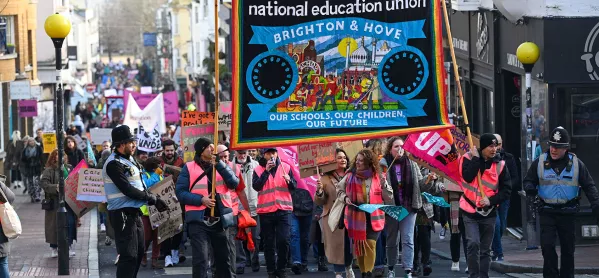A majority of parents and nearly half of the public support teachers taking strike action, and share concerns about the lack of education funding, according to a new poll out today.
Some 60 per cent of parents and 48 per cent of the public said they support the walkouts and are sympathetic to teachers’ campaign over pay and funding, the Ipsos poll found.
Around 40 per cent of the 2,187 adults questioned last week said they were concerned about the impact that industrial action was having on pupils’ education, but 60 per cent were more concerned about a lack of education funding in general.
While respondents said they are more likely to support nurses and ambulance workers (64 per cent and 61 per cent respectively), the poll, carried out as unions announced the latest round of action, found that teachers are more supported than railway workers (39 per cent), border force/passport control staff, civil servants, university staff (all 35 per cent) or driving examiners (28 per cent).
Reacting to the findings, Mary Bousted, joint general secretary of the NEU teaching union, said the union was “grateful” for parents’ support.
“While no teacher wants to be on strike action, we are grateful for the support of parents, and do not take it for granted. Many understand first-hand the issues faced by schools and colleges and their children’s teachers.
“They need no persuasion that there is disruption every day of the school year, thanks to the government’s poor decision making and short-sighted policies on education.”
Dr Bousted said that the NEU was urging education secretary Gillian Keegan to start negotiating with the profession to ensure “a resolution for the sake of teachers and children’s education”.
“The government’s continued stonewalling of talks will not improve their standing among parents and the general public. We need to see a substantive offer that will address the issues which are eroding this essential public service.”
Despite the majority of parents and guardians supporting the strike action, many appear worried about the impact of the strikes on pupils’ education, the poll found.
Over four in 10 (43 per cent) of those polled were worried about missed schoolwork because of strike action and 40 per cent were worried about exam results not reflecting pupils’ ability because of missed lessons owing to industrial action.
Public interest in strike action remains strong, with nearly three-quarters (72 per cent) saying they have paid close attention to news stories about the subject.
Just one in five of those polled say that Rishi Sunak’s government is doing a good job at negotiating with trade unions to prevent public sector workers going on strike, while almost half say they are performing poorly (48 per cent).
This has seen little change since January (17 per cent good job, 51 per cent bad job).
The Department for Education has been contacted for comment




